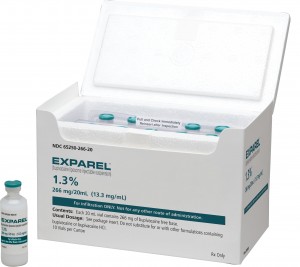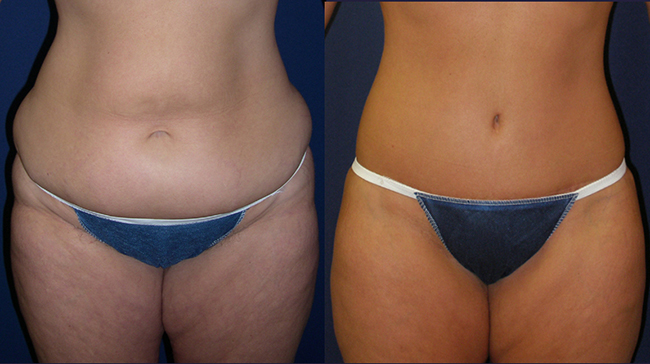Pain from surgery is a major point of hesitance for many would-be plastic surgery patients. Many interested in procedures might think, “Is it really worth the surgery, downtime and associated pain to get my body to where I want it?” The good news for patients is a new formulation of an old drug that not only blocks pain for up to three days, but by doing so decreases the downtime after surgery.
Dr. Stephan Finical of Charlotte Plastic Surgery has been using Exparel for nearly two years and has made it routine to include it into all tummy tuck procedures, finding it’s use to be a “miracle”.
By Stephan J. Finical, MD
and Adam McMillon
ThePlasticSurgeryChannel.com


Exparel continues to be heralded as a one-of-a-kind, pain-stopping medicine, but the truth is it’s been around for awhile… sort of. “Exparel is very clever because it’s an old local anesthetic, Bupivacaine, in a new wrapper (called a liposome) which makes it dissolve slowly over three days,” says Dr. Finical. “It’s just like if you go to the dentist, get an injection that lasts a few hours and you feel numb. When we inject an area with Exparel, it lasts for three days.”
Eliminating pain and decreasing downtime
Exparel has been out for a couple of years, allowing surgeons to get a good grasp on how it affects surgeries and patients. “It came out two years ago and we got ahold of it right away,” says Finical. “We started using it on our abdominoplasty (tummy tuck) patients. It has worked so well that we’ve used it ever since; it’s just part of our routine now.”
The benefits don’t stop at eliminating pain; providing a less painful recovery period means patients are more willing to be active, which positively affects how they recover. “It makes the patients feel better, which helps them to be more active right after surgery,” says Finical. “This is helpful for their lungs, their circulation and reducing blood clots by being up and moving around.”
Another bonus is not having to rely on narcotics to combat pain, something that has it’s own downsides which can make the recovery more difficult for patients to get through. “By severely reducing the need of narcotics to combat pain, patients don’t have to worry about getting nauseous or feeling groggy,” says Finical. “By the time they get through that first three days, there’s no rebound. There is no rebound pain increase; Exparel has gotten them through the worst of it.”

A noticeable difference for patients
Dr. Finical is not the only one who has seen a difference. “The difference is so significant that our anesthesiologists know it: they can sense it in the amount of medicines they give patients at the end of the operation,” says Finical. “Our nurses in the recovery area can also tell who has had Exparel and who hasn’t. They can tell in that early post-operative period who is more comfortable. The patients are more active, more eager to get up and move around. It’s really been a miracle kind of drug.”